One month into the Ukrainian war, Ukrainian President Zelensky’s Chief of Staff Andriy Yermak was interviewed by the Atlantic Council, an American non-partisan think tank. His message was quite simple: Russia’s invasion and war to exterminate Ukraine was a wider battle for the future of Western democracy and human civilization. Time was of the essence, he warned, noting that “The [NATO] Alliance is making decisions as if there [were] no war.” Sadly, he added, the Ukrainian government was being forced to “repeatedly remind” NATO that it needs more help.
Yermak was forced to lament the West’s persistent fear of provoking Moscow, in the spirit of appeasement. This attitude, of course, has governed the West for three decades, resulting in her present moral and geopolitical slumber. Yermak was blunt in assessing the West’s approach to security issues: “today’s security architecture is dead,” and “those who are not able to grasp it are simply blind.”
A year and a half into the war, we remain at the same juncture. Perhaps because of “Ukraine fatigue,” many in the West live and make decisions as if “there were no war.” NATO nations, moreover, despite overcoming significant barriers to unity, still need “repeated reminders” that an innocent nation, which did not ask for this war, needs help and that the future of free nations hangs in the balance.
Indeed it is we who need reminding of who started this outrageous war. And it is we who need reminding of the real issues: a nation’s sovereignty and territorial integrity, “guaranteed” by the 1994 Budapest Memorandum and recognized internationally, has been violated in the most despicable manner. Astoundingly, one searches in vain to find any geopolitical commentary since the war’s beginning that acknowledges this accord – an accord signed by the U.K. and the U.S.
At present, opposition to American support of Ukraine and involvement in the war is sure to continue. Some opponents are “Asia-first” or “China-first” in their priorities. Some view the war as merely a “regional” affair. Others argue for chiefly humanitarian aid, chafing that we’ve already invested too much – billions too much. Both conservatives and progressives will oppose it, believing that our own domestic issues have priority. Economists and politicians will argue for more sanctions. And because of Putin’s nuclear saber-rattling, many will continue to fear escalation, utterly unmindful of the important lessons of deterrence learned through the Cold War.
The truth of the matter is that the stakes of the war are far greater than most of us are willing to acknowledge. The future of the free world, represented by – but not limited to – Ukraine, is at issue, and that reality confronts us now. Ukraine cannot – she must not – lose this war. On the one side of the conflict, lest we’ve forgotten, we find an invading army, doing the bidding of a 21st-century Hitler and dependent on a paramilitary group manned chiefly by criminals who have been committing crimes against humanity. On the other side are Ukrainian citizens courageously seeking to defend their homeland against unjust invasion, enormous odds, and unspeakable crimes. If we in the West have any integrity, if we are concerned about basic security and thus the future and freedoms of nations around us, we simply have no choice. Otherwise, our “fear of escalation,” as French public philosopher Bernard-Henri Lévy has recently insisted, is a sign – indeed the sign – of moral cowardice and inhumanity, in the face of totalitarian manipulation.
Based on media reports, the recently convened Ukrainian “peace” talks hosted by Saudis, to which some thirty to forty nations were invited, agreed on the importance of international dialogue in order that “common ground” might “pave the way for peace.” What about a cease-fire? What sort of “peace” is envisioned by most nations? And would that “peace” be just?
Any sort of “cease-fire” at this point surely would be unjust and injurious to Ukraine, for by protecting the status quo it would allow Russia to re-arm and attack later. By contrast, justice, properly understood, entails a severe but necessary moral lesson for the offender. Correlatively, any sort of “compromise” would have similar deleterious effects, allowing Russia to save face and retain all or part of its conquered east Ukrainian territory. More importantly, this would send precisely the wrong message to any and every totalitarian despot in the world. In the words of Lévy, that message would be, very simply, “Invade, invade away; you’ll at least get something out of it.” Russia, therefore, must capitulate. Justice, our common humanity, and the future of human civilization demand it.
It needs emphasizing that the end of the war depends not on Ukraine or Zelensky but on the West, with the U.S. in the lead. The key is our provision of advanced weapons and airpower that Ukrainians so desperately need – which is to say, what we have hesitated providing for a year and a half. Against the thinking of many in the West, we must take a different view of Ukraine. We must eschew our tendency toward paternalism and understand that providing weaponry against the Russian threat contributes to our own self-defense and protecting the values we hold dear. Moreover, contributing in this way to Ukraine winning the war inhibits geopolitical evil in Asia and beyond. Again, China is watching and taking notes, as are those rogue regimes in league with Russia and China around the globe. It is Ukraine today; it is Asia and more tomorrow.
Early on in the war, rejection of a no-fly zone over Ukraine was virtually unanimous in the West. Few argued for it. But we must ask: How is the killing to be stopped? (As I write, another Russian missile has hit a prominent theater in the Ukrainian city of Chernigiv, killing seven and injuring 144.) And, does a nation not have the right – a territorial right – to protect its own borders? What is clear is that Putin wishes to restore the former Soviet empire; therefore, an independent and free Ukraine is an anathema. Does anyone really believe that he will stop with eastern Ukraine? For a realistic answer we need only consult the Moldovans, the Poles, the Romanians, and the Baltic states for starters.
As it concerns the war, the alternatives are essentially two: we confront and preempt Putin now or we attempt to confront him later. The latter would spell disaster insofar as it would require great escalation later while emboldening other rogue regimes to release global cataclysm. The simplest – and most effective – support for Ukraine that NATO nations can offer, as international security expert Richard D. Hooker, Jr., has argued, is to keep Russia out of Ukrainian air space, given Ukraine’s sovereignty and territorial integrity. The question that needs to be posed to air-defense critics is this: Why limit Ukraine’s defense merely to a ground war? Providing no air support prolongs the war with its horrendous casualties and costs. Such virtually guarantees a stalemate, preventing Ukraine from winning a war she did not choose.
Following World War II the Allies assumed that the specter of totalitarianism that burst upon the world in 1939 could never occur again. Alas, we find in our day that international security has collapsed. The unthinkable has reemerged. Where the West is committed to honoring a free nation’s sovereignty and territorial integrity, as well as the right to live in peace and freedom, we must not fear to act.
The world is less free today than it was in the 1990s, and this trend is guaranteed to continue. Standing alone, Ukraine will fall. Western nations are at a crossroads, and we will need to act – not a year or two from now but in the present moment. If we cannot actively defend Ukraine, according to her acute military needs, there is nothing in our culture of any value worth defending. At that point, honesty requires of us the basic acknowledgement: we would rather that evil triumph.
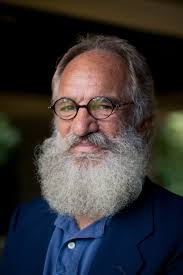
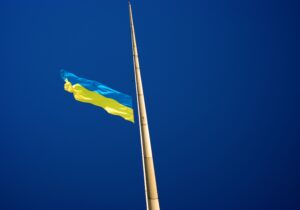

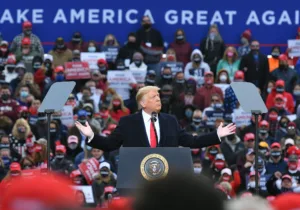
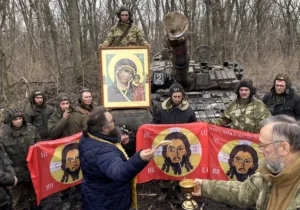
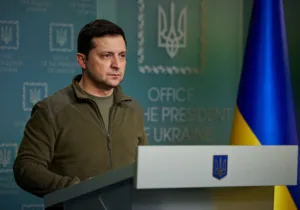

 Sponsor a student for Christianity & National Security 2024
Sponsor a student for Christianity & National Security 2024